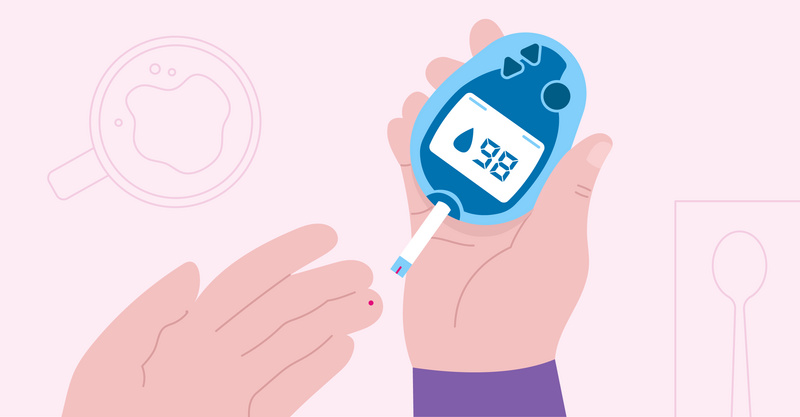Key Points
- During the pandemic, many routine lab tests and non-emergency medical appointments were postponed and canceled.
- It is essential for people with Type 1 or Type 2 diabetes to schedule A1C and other recommended tests and speak to a provider about their diabetes care.
You may have found yourself walking a mental tightrope while living with diabetes during the pandemic. Should you isolate yourself at home, or is it safe to keep your routine lab tests and medical appointments to stay on top of your diabetes?
If you are struggling with managing diabetes during this pandemic, you are not alone. According to the Centers for Disease Control and Prevention (CDC), over 34.2 million adults in the United States live with diabetes. 90-95% have type 2 diabetes. And 1.7 million new cases of diabetes are diagnosed each year!
Adding to the disease burden is that, according to the CDC, more than one in three Americans are pre-diabetic. This means that without timely intervention, monitoring, and lifestyle changes, these individuals may develop full-blown diabetes.
Maintaining blood sugar levels at your target range involves:
- Regular evaluations by medical professionals,
- eating a nutritious diet,
- exercising,
- taking your medication as prescribed,
- lowering your stress levels, and
- maintaining a regular schedule of A1C and any other recommended lab tests.
However, COVID-19 has made diabetes management much trickier.
Challenges managing diabetes during COVID-19
Unfortunately, battling diabetes during a pandemic presents a Catch-22 situation.
A recent US study by the American Diabetes Association (ADA) shows that people with diabetes have a 3-4 times higher risk of being hospitalized with more severe illness due to COVID-19. This applies to both Type 1 and Type 2 diabetics. This risk increases with obesity, heart disease, and other chronic illnesses. Given these risk factors, you may have - like many others – chosen to stay indoors and postpone your regular exercise schedule, diabetes tests, and doctor visits.
However, the best way to lower your risk is to maintain your blood sugar levels. Research from Japan published by the ADA shows that lowering blood insulin levels helps reduce the risk of getting COVID-19 for older, obese, and diabetic individuals. Exercising, eating well, and getting regular A1C tests and checkups play a huge role in detecting and addressing potential issues early. Without them, blood sugars may remain high and increase your risk of COVID-19 and other diabetes-related health conditions.
Diabetes and its effect on our health
Diabetes is the seventh leading cause of death in the US (a conservative estimate by the CDC). It is a complex condition of systemic inflammation and affects our entire body. Left unchecked, high blood sugar from diabetes can cause chronic kidney disease, issues with our blood vessels, peripheral nerve disease, heart disease, eye problems, gum disease, and much more. The following list, from the CDC, explains how diabetes can impact key systems:
- Having diabetes makes you twice as likely to have heart disease or a stroke than someone without it. Elevated blood sugar often goes hand-in-hand with hypertension or high blood pressure. The presence of both conditions worsens each other.
- Diabetes impairs our immune systems and makes us more susceptible to infection from viruses, bacteria, and other disease-causing agents. Many people with diabetes suffer from skin, urinary tract, and respiratory infections. Because of diabetes, cuts and wounds may take longer to heal, increasing your risk of getting an infection.
- Our eyes are also often affected by diabetes. High circulating blood sugar can cause several eye problems, including diabetic retinopathy, cataracts, and glaucoma. All these conditions lead to impaired vision, and in severe cases, loss of sight.
- Diabetes and gum disease have a bidirectional effect on each other. Diabetes puts you at a greater risk for gum disease. Meanwhile, severe gum disease spikes blood sugar levels and makes it harder to control your diabetes.
While the above list the most common issues related to diabetes, the list is not comprehensive. Apart from our physical health, elevated blood sugar levels also affect our mental health.
Diabetes impacts our mental health; the reverse is also true
Many conversations around diabetes management do not include the topic of mental health. This is unfortunate because the mind-body connection is critical.
According to the CDC, people with diabetes are 2 to 3 times more likely to have depression than people without diabetes. Research shows that having depression is linked to a higher rate of diabetes-related complications, disability, and even loss of years to life. Depression can make it harder to maintain the lifestyle changes required to take care of your blood sugar. These include maintaining a regular diet, exercise regimen, medication protocol, getting tested, and visiting your doctor. Additionally, adults with depression are more likely to smoke cigarettes and drink too much alcohol – both risk factors for diabetes.
The exact mechanism of how the two conditions affect each other is still unknown. Still, according to the Mayo Clinic, diabetes and depression can be treated together and managed effectively.
Additionally, how we handle mental stress affects our blood glucose levels. For many of us, the pandemic has been a new and intense source of anxiety and stress in our lives. Emotional stress directly influences our blood sugar levels. With high levels of chronic stress, the body releases cortisol – the stress hormone. Cortisol in our blood reduces the amount of insulin released by the body in Type 2 diabetics. Without insulin, sugar from the food we eat remains in the bloodstream and elevates our blood sugar levels. For people with Type 1 diabetes, stress can increase or decrease blood sugar depending on the individual.
These reasons make it even more important to make sure you get your routine tests and medical appointments back on track. Healthcare providers encourage you to schedule and keep your regular health checkups.
What to do next: How to get your blood sugar levels back on track?
When the pandemic began, many people were, understandably, hesitant to get their regular tests or schedule appointments with their physicians. However, most hospitals and healthcare professionals now adhere to the CDC guidelines on COVID-19 safety. You may call ahead and ask your physician’s office about their safety protocols before scheduling your recommended tests and doctor visits. You may use Solv, a hassle-free way to find providers and labs near you and schedule your medical appointments.
Scheduling your A1C lab tests
While there are many at-home glucose monitoring devices, the best test for diabetes, according to [source], is a hemoglobin A1C test administered in a lab. The A1C test measures average blood sugar levels over the past three months. Most people with diabetes are advised to get an A1C test twice a year. However, if you have issues maintaining blood sugar levels at the recommended range, your doctor may recommend more frequent tests. Talk to your doctor to learn what is best for you.
Other tests that may be required based on your personal risk factors
According to the CDC, you may also need additional blood sugar tests based on your levels, family history with diabetes, other medical conditions, and more factors.
Since diabetes affects the entire body, a heart health check is often recommended. This includes blood pressure monitoring and tests for cholesterol and triglyceride levels. Regular eye checks and visits to the dentist are also recommended for people with diabetes, according to the CDC.
The views expressed by authors and contributors of such content are not endorsed or approved by Solv Health and are intended for informational purposes only. The content is reviewed by Solv Health only to confirm educational value and reader interest. You are encouraged to discuss any questions that you may have about your health with your healthcare provider.
Frequently asked questions
How many adults in the United States live with diabetes?
According to the Centers for Disease Control and Prevention (CDC), over 34.2 million adults in the United States live with diabetes.What is the best way to lower the risk of severe illness from COVID-19 for people with diabetes?
The best way to lower the risk of severe illness from COVID-19 for people with diabetes is to maintain blood sugar levels. This can be achieved by exercising, eating well, and getting regular A1C tests and checkups.What are the potential health complications that can arise from diabetes?
Diabetes can lead to several health complications such as chronic kidney disease, issues with blood vessels, peripheral nerve disease, heart disease, eye problems, and gum disease.How does diabetes affect mental health?
People with diabetes are 2 to 3 times more likely to have depression than people without diabetes. Depression can make it harder to maintain the lifestyle changes required to take care of blood sugar, such as maintaining a regular diet, exercise regimen, medication protocol, getting tested, and visiting your doctor.How does stress affect blood glucose levels?
Emotional stress directly influences blood sugar levels. With high levels of chronic stress, the body releases cortisol – the stress hormone, which in turn reduces the amount of insulin released by the body in Type 2 diabetics. This can cause sugar from the food we eat to remain in the bloodstream and elevate blood sugar levels.What is the recommended test for diabetes?
The best test for diabetes is a hemoglobin A1C test administered in a lab. This test measures average blood sugar levels over the past three months.How often should people with diabetes get an A1C test?
Most people with diabetes are advised to get an A1C test twice a year. However, if you have issues maintaining blood sugar levels at the recommended range, your doctor may recommend more frequent tests.What other tests may be required for people with diabetes?
According to the CDC, additional blood sugar tests may be required based on your levels, family history with diabetes, other medical conditions, and more factors. Regular heart health checks, eye checks, and dentist visits are also recommended for people with diabetes.
Solv has strict sourcing guidelines and relies on peer-reviewed studies, academic research institutions, and medical associations. We avoid using tertiary references.


 LinkedIn
LinkedIn




![Maintaining Healthy Cholesterol Levels [Infographic]](https://d1kve3ll6vvkpr.cloudfront.net/dir/media/W1siZiIsIjIwMTQvMDMvMDkvMTBfMjJfMzZfNThfY2hvbGVzdGVyb2wuanBnIl0sWyJwIiwidGh1bWIiLCI4MDB4NDE3IyJdLFsicCIsImVuY29kZSIsImpwZyIsIi1xdWFsaXR5IDk1Il1d/file.jpg?basename=Maintaining+Healthy+Cholesterol+Levels+%5BInfographic%5D&sha=7e0cef62b531a28b)





